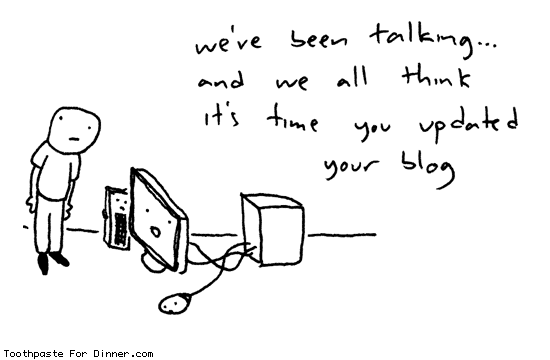
I was excited to get started on working with New Media in this class, in the context of "Writing about Literature." I expected it to be a bit tough and frustrating at times, and it certainly turned out to be. For instance, I spent a good 2 hours one day completing absolutely no new research or writing, but just trying to get my text into the right text size and font. I ended up having to settle for something that would be okay, but not great, because I just couldn't afford to spend more time on the form of my blog without making progress in other areas.
Having said that, I believe that working with new technology affords new ways of making intellectual links, ways of thinking that would simply not be available in a more traditional context. For instance, in one blog post, I was able to post some paintings I worked on this semester in a personal exploration of what was generally a more traditionally academic mode. By having a format in which I could then post a video of my textual source immediately following the paintings, I could both connect myself personally to the subject, and make academic comments about the differences in the medium of painting and film. Such a comparison would be difficult to represent just through text in a more traditional paper, especially in a topic like mine that looks specifically at visual ramifications of texts.
As I think about it now, the ability to embed video in a blog post allows it some serious advantages to a text book. A textbook rarely comes with film examples on DVD, even when the text is specifically a text on film criticism or history. But even if the text did come with a DVD or CD to offer much-needed representations of the subject matter, having an embedded video directly beneath a bit of text could do the job so much more efficiently and elegantly. Such a pedogogical tool would even allow less text to analyze the same thing, just because of the ease of reference.
Additionally, the sort of "open-source" quality of a blog or open-access online resource certainly fulfills the objectives of a university...mine has as one of its institutional objectives to "advance truth and knowledge" and "extend the blessing of learning," things that are much more available and accessible on this blog than they would be in an expensive text book. A blog invites rather than excludes, both from academic circles and from the community at large. Connected with this idea of "invitation" is the way that something like a blog encourages feedback and discussion through it "comments" feature, allowing further investigation to occur for readers, and for the creators of the blog.
Still, there are some drawbacks to our blog-writing format. To start, it was difficult to translate more traditional methods in to a new medium; this wouldn't be such a bad thing, accept that in our continued academic career, we will likely just need to go back to the old way of doing things. It might have been interesting to complete work in a new format, like our blog format, and also a more traditional product, and compare the two. The open-ended nature of a blog is perhaps a better analogy of the way intellectual exercise never really concludes on a topic, and yet the traditional "final draft" also allows for useful summations and precise characterizations of difficult material to be used by others for important work. A blog that remains too exploratory or wishy-washy is not as useful in some ways in the public sphere as a polished product that at least stands firm on a side, allowing further researchers to offer modifications and qualifications that can refine a problem into cohesive, best effort solution.
I believe that for me, this blog was a very useful tool, one that offers ways of seeing media that are necessary and yet undervalued in academia so far. Yet it can't quite replace traditional modes...I still think that there is something extremely valuable about struggling to craft something just the way you want it, even if "perfection" is a unrealistic thing.
No comments:
Post a Comment